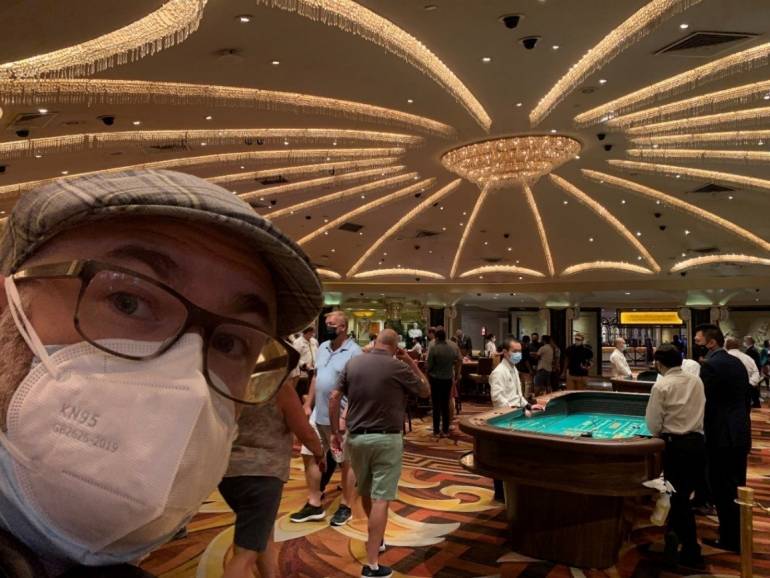One of the many casualties of the pandemic for me has been the Edinburgh festival, with US/UK travel bans keeping me away for the longest period since I was 16.
This led me to seek out my fix of over-the-top circus shows here in the US this summer, taking me to the blinding lights of Las Vegas. It was not totally dissimilar to the Edinburgh festival1, but with better weather, less Irn Bru and a large night club in the shape of the Eiffel tower instead of the castle.
On the casino floor I came face to face with another fascinating cognitive bias... I took to the tables and began with exceptional luck, very quickly doubling my chips. Feeling good, I played on. Then I gradually lost all my winnings, ultimately leaving with the same number of chips that I’d started with2 - and I did not feel very good about it. Logically, I was in the same position I had been at the start of the night and I should have felt the same, but the losses had affected my mood much more than the wins and resulted in a bad feeling. I had just experienced the negativity effect.
The negativity effect: an asymmetry of response to positive and negative experiences, resulting in stronger emotional reactions to negative events than to positive events.
And if you’d like to see this experience acted out with much larger stakes, a far more improbable winning streak and a more severe mockney accent, the very same thing happens to Jason Statham in the 2015 Statham-by-the-numbers movie, Wild Card.

The five Fs
So, how much more are we affected by a negative event than a positive one?
Dr Robert Gottman, an American psychologist eminent in the field of relationships, is the proponent of what is known as the magic ratio: the idea that successful relationships need at least five positive interactions for every negative interaction. In the 2019 book The Power of Bad, this ratio is referred to as the five Fs – suggesting that couples should aim for a minimum of five “fun times” for every “fight” to maintain a harmonious relationship.
This ratio seems to put a number on the negativity effect, that to balance out a negative event we need to go through at least five positive events, suggesting that the number of wrongs that make a right is around 1/5! What do you think? Does this number sound correct? I’m not sure it’s ubiquitous; we seem to need far more than five 5-star reviews online to make up for a 1-star review, and it’s only really now after nine Fast and Furious movies that I’ve forgiven the studio for Tokyo Drift.
Prospect theory and loss aversion
In economics, the negativity effect is formalized as prospect theory, which was introduced by Kahneman and Tversky in their seminal 1979 paper, and was cited as a contributing factor to Kahneman’s Nobel prize in Economics.
A key factor in prospect theory is the idea of financial loss aversion. Given the negativity bias, people value the avoidance of losses more highly than maximizing gains. This could explain the infamous equity premium puzzle – the fact that stocks and shares have historically returned far greater returns in excess of bonds than predicted by classical economic models. If people are driven by loss aversion, they will need to be compensated at a higher rate to tolerate the possibility that their initial investment may go down as well as up (resulting in lower prices and higher returns through supply & demand).
Pension plans and investment account providers should take note. If savers are invested in volatile funds and have access to their account balance every day, they are likely to be dissatisfied with their investments as they will experience the losses each time their investments fluctuate downward. This could be helped by encouraging savers to monitor their fund values less frequently or to present the changes in value of a fund in comparison to the original investment rather than the previous day’s value.
In addition, occupational pension plans trying to encourage their members to make the most of employer matching contributions would probably have more success if they framed the information as a way to avoid losing out on money that is rightfully theirs, rather than gaining an increase to their savings.
Smoothing out extremes
The negativity effect may result in us valuing experiences that overall are not as good as other options but do avoid negative events along the way.
In football (soccer) a lot is made of a team going on an unbeaten run of games (not necessarily a winning streak as it is possible to draw/tie games). Maybe the negativity effect means fans hate to lose more than they love to win. In the 2003/04 Premier League season, Arsenal managed to go for the whole season without losing a game, with that team going down in history and becoming known as the Invincibles. However, the total number of league points achieved by the Invincibles that season has been beaten in 4 out of the last 5 seasons, with much less fanfare.
The negativity effect may result in us choosing a series of 3/5 experiences over fluctuations between 1/5 and 5/5 experiences. This is a very reasonable outcome if the 1/5 event is catastrophic, such as being eaten by a lion or falling off a cliff (and the need to avoid such events is probably how the negativity effect developed in the first place). However, if we are able to survive the 1/5 events, going for 1s and 5s will make for the best stories! I have always appreciated my friend Tim’s ability to persevere through a bad first date due to the excellent anecdotes it has provided.
What do you think?
Do five rights make up for a wrong? Does framing pension plan participation as a “something not to miss” rather than “something extra” increase participation? In playing it safe, have you missed out on some great anecdotes? All these questions are intricately intertwined with the strength of the negativity effect.
1 What is commonly referred to as the Edinburgh festival is really a combination of multiple international arts festivals that are held in the Scottish capital city of Edinburgh each summer. There is a jazz & blues festival, a book festival, a film festival, an art festival, the Edinburgh International festival, and the Festival Fringe all going on at the same time. If you’ve not been, I thoroughly recommend it. If you need to work or commute in Edinburgh during the month of August, my sympathies go out to you!
2 With the odds in a casino stacked against the players, I think the best chance of winning is to find a game where it is possible to lose slowly enough that the free drinks you receive while playing are worth more than the money you lose.




